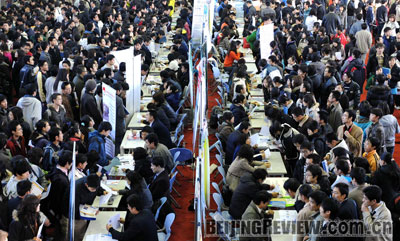|
 |
|
STRONG COMPETITION: Graduates pack into a job fair at Tianjin University of Science and Technology on November 28 last year (LIU HAIFENG) |
Xie Hanshuang, a senior account executive at a public relations company in Beijing, had planned to fly with her husband to Chongqing, a municipality nearly 2,000 km away from Beijing, for their annual Spring Festival family reunion. She hates the alternative, a 25-hour trip on a train packed with people making their way home for China's biggest festival.
Yet at the beginning of November last year, less than three months away from the Spring Festival, Xie had to reconsider her budget for the festival trip. Instead of awarding her a 20-percent year-end pay raise as she expected, the company raised her pay by a modest 8 percent. Her resulting lack of money prompted her to choose the train.
"If this was a normal year without the economic slowdown and I could get my normal pay raise, I would spend more on clothing and fancy dinners and raise my monthly mortgage payments. Now I have to wait a little bit," she told Beijing Review. Xie and her husband bought their first apartment in 2007.
Xie still considers herself lucky compared with colleagues. She said many of them received no pay increase at all. Her company froze salaries for manager positions and above.
Asking for a pay increase is the last thing on the minds of many white-collar workers in China. According to a widely popular online list of 10 golden rules to survive the financial crisis titled, "Dos and Don'ts During the Financial Crisis," people should not ask for more money as layoffs usually begin with high-salaried positions.
At a December press conference for the launch of the Chinese Academy of Social Sciences' (CASS) annual comprehensive report on Chinese society, Li Peilin, head of the Institute of Sociology at CASS, said that the financial crisis had affected the Chinese economy in a different way to the United States.
He told Shanghai-based China Business News that in the United States the financial crisis spread from the virtual economy to the real economy while in China it first happened in the real economy, featuring the financial difficulties or even bankruptcies of many export-oriented small and medium-sized companies, and then spread to the virtual economy, consumption and other sectors. The ripple effect in the labor market might take this same route, he added. The first large layoffs have already happened among migrant workers in the manufacturing sector.
Some white-collar workers have already felt the chill. According to an online survey conducted by job-hunting website Zhaopin.com in December 2008, of the nearly 6,000 respondents over 40 percent said they just wanted to keep their jobs without expecting a pay raise; nearly 40 percent said they did not expect a year-end bonus; and over half were worried about losing their job. Human resources experts from Zhaopin.com said few Chinese companies are laying off employees and the impact of the economic slowdown on white-collar workers is mainly psychological for now.
Tan Wenwen, a textile sales representative for the largest export company in east Jiangsu Province, said she decided to put off her plan to buy a car after the company's business slowed in the second half of 2008. Since a major part of her salary is a bonus based on how much she sells, she expects a sharp decrease in her income in 2009. "I had a very good year in 2008, but I know if the goods for my clients don't sell well in their countries, they won't sign new deals with us in 2009," she told Beijing Revie
Golden Rules for Surviving the Crisis
First, don't quit your job; don't change your job; don't change your career; don't start your own business.
Second, collect information on several vacancies in other companies that you can apply for.
Third, don't ask for a pay raise since layoffs usually start with high-salaried positions.
Fourth, help friends with job hunting and introduce them to vacancies if you can, so that they will help you out if you're in need.
Fifth, put money in the bank or buy treasury bonds; deposit money in a foreign currency and don't buy any stocks.
Sixth, mail money to your parents every month.
Seventh, don't buy a car.
Eighth, the worst part of the crisis is yet to come. Don't be overconfident.
Ninth, don't get divorced and don't have children.
Tenth, try to live a frugal life and cut your living expenses by 30 percent.
(An online post on golden rules for surviving the financial crisis that is popular among white-collar workers.)
| 